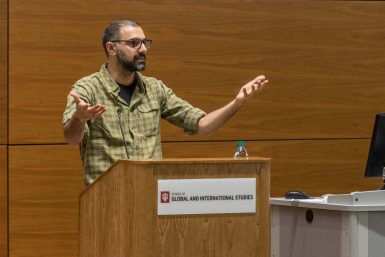Demonetization has changed citizen, state relationship, Aman Sethi says
There’s a new relationship between citizens and the state, said Aman Sethi, associate editor at the Hindustan Times, Wednesday.
This new relationship has led to higher stakes surrounding surveillance of citizens, Sethi said.

What caused this?
Seth said it’s because of the relationship between three issues surrounding money: demonetization, digitization and control.
About 50 people gathered in the Global and International Studies Building auditorium Wednesday night to hear Sethi speak about demonetization, digitization and control. Sethi’s talk, called “Some Thoughts on Money,” was a part of The Media School’s semester-long Speaker Series.
The talk was also a part of India Remixed, a global arts and humanities festival that explores Indian art and culture. Sethi is a former Africa correspondent for The Hindu. He also wrote the book A Free Man: A True Story of Life and Death in Delhi.
Sethi broke his talk into the three different money categories. He said he had been interested in these ideas for years.
He started by talking about demonetization. He talked about India Prime Minister Narendra Modi’s decision to remove 500- and 1,000-rupee notes as legal tender. This decision caused panic in India, resulting in long lines at ATMs and banks, and outbreaks of violence.
The goal of India’s government was to bring back unaccounted cash, or “black money,” into the economy.
This shocked the people of India, Sethi said. No one knew how much cash would come back.
However, Sethi said after almost all of the money in India came back, many people realized demonetization was actually catastrophic.
“The Indian people have successfully used the government as a money laundering machine,” Sethi said.
This demonetization then led to digitization, the second theme of his talk, Sethi said.
Sethi talked about digitization in terms of apps such as WeChat, a Chinese social media app that provides everything from messaging to payment services. Sethi said that when India’s government and residents started using multi-platform apps like WeChat, the government expected all of India’s problems to be solved.
But it’s not that simple, Sethi said.
“As you start digitizing, you essentially build up this whole new world of data,” Sethi said.
When you create these entire new worlds of data, Sethi said, an issue of control, the third topic of his talk, starts to arise.
Soon, India’s government started relying on biometrics screenings and requiring all of its citizens to have one. The government used these screenings to keep track of everything a citizen does, including paying taxes.
The government hoped this would solve India’s problems with corruption. With multi-platform apps and with biometric screenings, the government became invested in citizens’ everyday lives.
This could be derived from both demonetization and digitization, Sethi said.
Together, what these two concepts do is set up a continuous surveillance on citizens, which can cause issues surrounding control, Sethi said.
“There’s always a state of tension between the state that wants to survey and the citizen that would rather not be surveyed,” Sethi said.

